Isabel Waidner
Isabel Waidner

Corey Fah Does Social Mobility
The radical, joyful follow-up to the Goldsmiths Prize-winning Sterling Karat Gold.
This is the story of Corey Fah, a writer on the cusp of a windfall, courtesy of the Social Evils prize committee, for whom the actual gong - and with it the prize money - remains tantalizingly out of reach.
Neon beige, with UFO-like qualities, the elusive trophy leads Corey, with partner Drew and surprise eight-legged companion Bambi Pavok, on a spectacular detour through their childhood in the Forest - via an unlikely stint on reality TV. Navigating those twin horrors, through wormholes and time loops, Corey learns - the hard way - the difference between a prize and a gift.
Both radiant and revolutionary, Isabel Waidner's fiction gleefully takes a hammer to false binaries, boundaries and borders, turning walls into bridges and words into wings. Fierce, fluid and funny, they free us to imagine another way of being.
This is a novel about coming into one's own, the labour of love, the tendency of history to repeat itself and the pitfalls of social mobility. It's about watching TV with your lover.
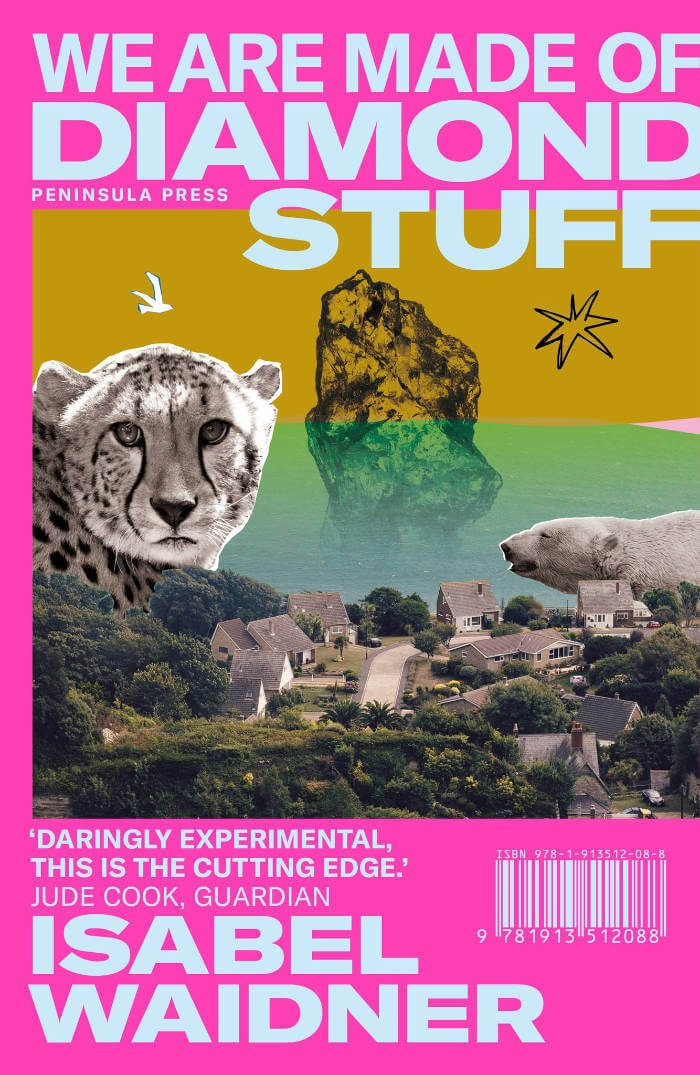
We Are Made of Diamond Stuff
Polar bears emerge from t-shirts. Reeboks come to life. Nothing is normal in the house of Mother Normal.
In Isabel Waidner’s second novel, we follow an unnamed narrator who looks like Eleven from Stranger Things, but is in fact a 36-year-old migrant working for minimum wage in a run-down hotel on the Isle of Wight. Along with their best friend, Shae, the narrator faces Ukip activists, shapeshifting creatures, and despotic bosses while trying to hold down their job and preparing for their Life in the UK test.
This is fiction that extends the avant-garde tradition beyond the upper-class experience that it usually chronicles – making it over as an ally of working-class queer experience. Set against a backdrop of austerity and decline, We Are Made of Diamond Stuff is an irreverent, boundary-erasing piece of work that celebrates the radical potential of resistance, ingenuity, and friendship.
Shortlisted for the Goldsmiths Prize and the Republic of Consciousness Prize.

Sterling Karat Gold
Sterling is arrested one morning without having done anything wrong. Plunged into a terrifying and nonsensical world, Sterling – with the help of their three best friends – must defy bullfighters, football players and spaceships in order to exonerate themselves and to hold the powers that be to account.
Sterling Karat Gold is Kafka’s The Trial written for the era of gaslighting – a surreal inquiry into the real effects of state violence on gender-nonconforming, working-class and black bodies.
Following the Goldsmiths Prize–nominated We Are Made of Diamond Stuff, Isabel Waidner’s latest novel proposes community, inventiveness and the stubborn refusal to lie low as antidotes against marginalisation and towards better futures.
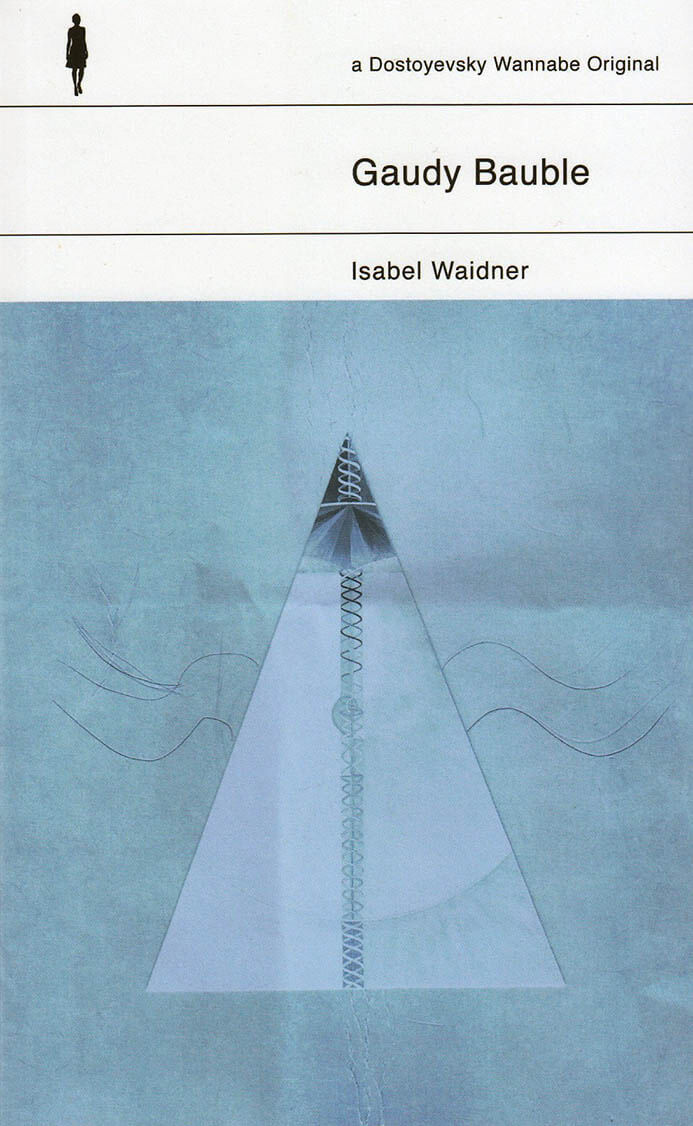
Gauby Bauble
Gaudy Bauble stages a glittering world populated by GoldSeXUal StatuEttes, anti-drag kings, Gilbert-&-George-like lesbians, maverick detectives, a transgender army equipped with question-mark-shaped helmets, and birds who have dyke written all over them. Everyone interferes with the plot. No one is in control of the plot. Surprises happen as a matter of course: A faux research process produces actual results. Hundreds of lipstick marks reanimate a dying body. And the Deadwood-to-Dynamo Audience Prize goes to whoever turns deadestwood into dynamost.
Gaudy Bauble stages what happens when the disenfranchised are calling the shots. Riff-raff are running the show and they are making a difference.
"I'm besotted with this beguiling, hilarious, rollocking, language-metamorphosing novel. The future of the queer avant-garde is safe with Isabel Waidner." - Olivia Laing
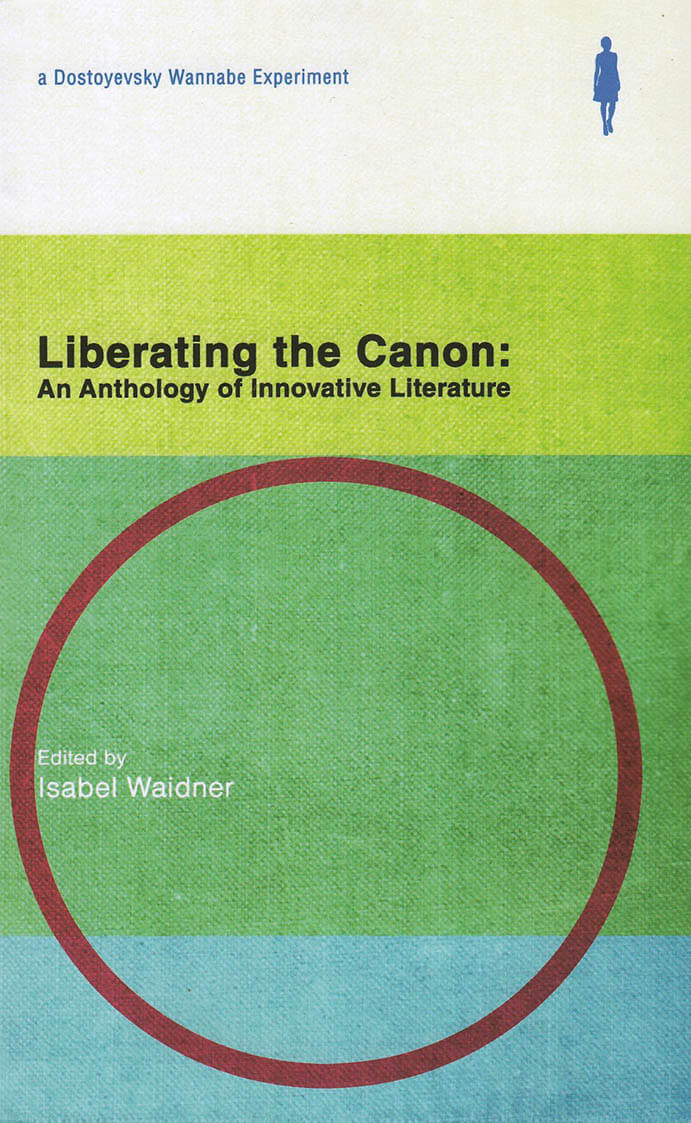
Liberating the Canon
Liberating the Canon is an edited anthology capturing the contemporary emergence of radically innovative and nonconforming forms of literature in the UK and US. Historically, sociopolitical marginalisation and avant-garde aesthetics have not come together in UK literature, counterintuitively divorcing outsider experience and formal innovation. Bringing together intersectional identity and literary innovation, LTC is designed as an intervention against the normativity of literary publishing contexts and the institution 'Innovative Literature' as such. More widely, if literature, any literature, can act as a mode of cultural resistance and help imagine a more progressive politics in Tory Britain and beyond, it is this.
Contributors are Mojisola Adebayo, Jess Arndt (US), Jay Bernard, Richard Brammer, Victoria Brown, SJ Fowler, Juliet Jacques, Sara Jaffe (US), Roz Kaveney, R. Zamora Linmark (US), Mira Mattar, Seabright D.Mortimer, Nat Raha, Nisha Ramayya, Rosie Snajdr, Timothy Thornton, Isabel Waidner, Joanna Walsh and Eley Williams.
Isabel Waidner is a writer and cultural theorist. She is the author of three books of innovative fiction, most recently Gaudy Bauble (Dostoyevsky Wannabe, 2017), which is currently longlisted for the Republic of Consciousness Prize for "hardcore literary fiction and gorgeous prose". Her articles and short fictions have appeared or are forthcoming in journals including 3: AM, Berfrois, Configurations, The Happy Hypocrite, The Quietus and Minor Literature[s]. She is also the editor of Liberating the Canon: An Anthology of Innovative Writing (Dostoyevsky Wannabe, 2018) which explores the relationship between identity, intersectionality and innovation in literature. As part of the indie band Klang, Waidner released records on UK labels Rough Trade (2003) and Blast First (2004). She is a lecturer in English and Creative Writing at Roehampton University, London, UK.
And more

Tripwire 15 - Narrative/Prose
Narrative/Prose issue, featuring a special section: I was writing, but it was drawing: a Renee Gladman mini-feature with work by Renee Gladman * Earl Jackson, Jr. * Bruna Mori * Alexis Almeida on Renee Gladman & Julie Carr * Lewis Freedman & Vanessa Thill on Renee Gladman & Mirtha Dermisache. as well as work by Isabel Waidner * sissi tax (translated by Joel Scott & Charlotte Theißen) * Susan Hefuna * Mira Mattar * Lital Khaikin * Maryam Madjidi (translated by Ruth Diver) * Omer Wasim & Saira Sheikh * Ilse Aichinger (translated by Christian Hawkey & Uljana Wolf) * Bronka Nowicka (translated by Katarzyna Szuster) * Maude Pilon (translated by Simon Brown) * Mehmet Dere * Syd Staiti * Jena Osman * Germán Sierra * Natani Notah * Julia Bloch on Bernadette Mayer * Robert Glück on Clarice Lispector * Rob Halpern on Bruce Boone & Dennis Cooper *Dylan Byron on/after Bruce Boone * Linda Bakke on Communal Presence: New Narrative Writing Today * Anna Fidler * Corey Zielinski on Bob Glück & Writers Who Love Too Much: New Narrative 1977-97 * Jackie Kirby on From Our Hearts to Yours: New Narrative as Contemporary Practice * David W. Pritchard on Kevin Killian * Dale Enggass on Simone White * Allison Cardon on Anne Boyer * Robert Balun on Leslie Kaplan * Marco Antonio Huerta on Omar Pimienta * Allison Grimaldi Donahue on Josué Guébo * Sara Florian on Lasana Sekou * Louis Bury on Allison Cobb * Hugo Gibson on Annie Ernaux.

Worms #8 'The Elements Issue'
In this special edition, double-cover issue of Worms, we bring you not one, but two cover stars. The indelible Tyson Yunkaporta and the iconic Anne Waldman adorn both sides of Worms 8 which can also be thought of as ‘The Elements Issue’. It was dreamt up in a dreary and grey August in London, while the rest of the world suffered through the hottest days on record. As we witnessed, and continue to witness, such climate catastrophe, we turned to the literature we love to help us understand, to challenge us, and to offer us some comfort.
The issue is split into four sections—earth, fire, air and water—but its roots and webs push beyond what we typically think of as ‘the natural’: tales from the kitchen from Rebecca May Johnson and Slutty Cheff, reflections on gardening and colonialism, writer's block and clogged pipes, how to blow up pipelines with Andreas Malm, grief and writing, recovery and nature with Octavia Bright, social mobility with Isabel Waidner, the wide range of issues raised by the underrepresentation of First Nations people in literature with Evelyn Araluen and much, much more.
We hope that this issue can be a flame of hope, inspiration, or something that simply sustains in such turbulent times.
Featuring
Tyson Yunkaporta, Isabel Waidner , Jamaica Kincaid, Melissa Broder , Evelyn Araluen, Bruce Pascoe, Octavia Bright, Nora Treatbaby , Nerea Calvillo , Anne Waldman , Alexis Pauline Gumbs , Léuli Eshrāghi, Madeline Cash , Andreas Malm, Rebecca May Johnson
Contributors
Stella Murphy , Ben Redhead, Phoenix Yemi, Sam Moore, Devils Claws, Pierce Eldridge, Manon Mikolaitis, Caitlin McLoughlin, Isabel MacCarthy, Elodie Saint-Louis , Nettle Grellier, Amelia Abraham, Ryan Pfluger, Rose Higham-Stainton , Emma Crabtree, Ignota, Lydia Luke, Chloe Sheppard , Clem MacLeod , Carolyne Loreé Teston , Emma Cohen, Olive Couri, Raheela Suleman , No Land , Jacqueline Ennis-Cole , Sufia Ikbal-Doucet, Rhett Hammerton, Zara Joan Miller , Kate Morgan , Bug Shepherd-Barron, Zoe Freilich , Slutty Cheff , Clemmie Bache , Violet Conroy , Sarah White , Jemima Skala , Stephanie Francis-Shanahan
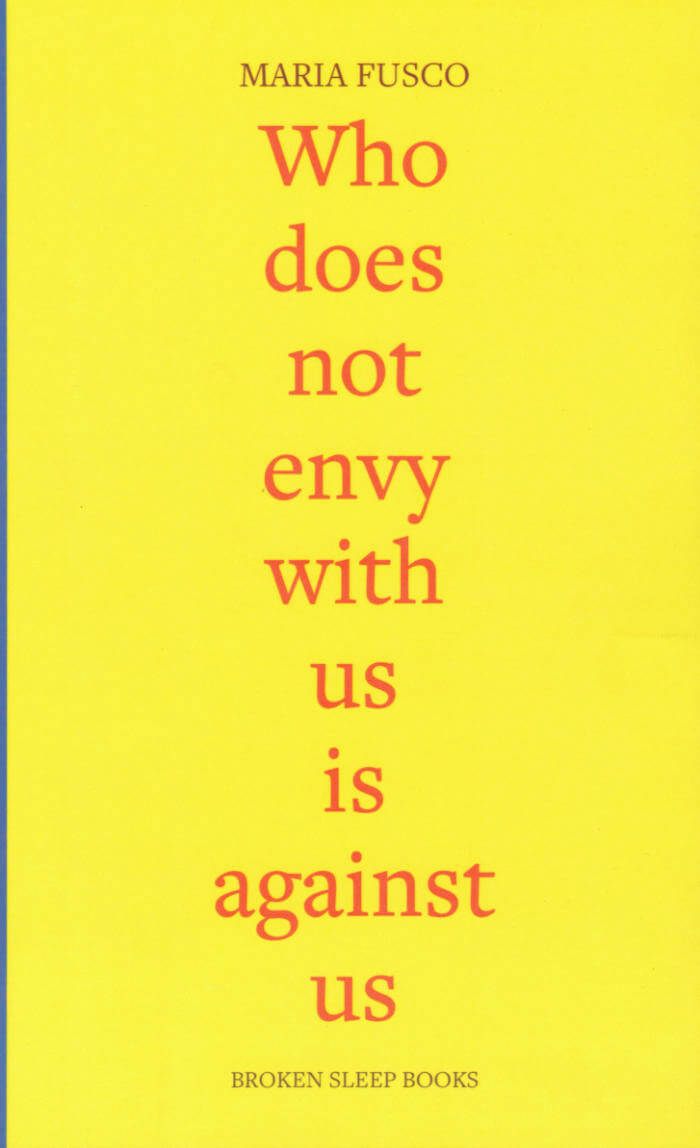
Who does not envy with us is against us: three essays on being working-class
Who does not envy with us is against us is a collection of essays on working-classness that demonstrates Maria Fusco's exceptional talent for weaving together the analytical and the poetic to create an affecting and profound work.
With expressive prose, Fusco deftly captures the experiences of the global working class, illuminating emotions that unite them across borders and lines. This is a tribute to the resilience and tenacity of working-class communities, and an invitation to readers to join in a deeper understanding of their struggles and triumphs. Through her masterful storytelling, Fusco utilises the power of language to elevate the voices of those who have long been silenced, creating a symphony of words that will echo long after the final page.
"I love this book with my entire life and beyond. Fact that I grew up a thousand miles south of Belfast, but, days after reading, feel like I'm - or should be - from there is testament to Fusco's analytic and lyric genius, and her ability to move and affect. Fusco mobilises a previously unnamed mood shared by the international, intergalactic working classes, I've never seen anything like it. Read this book." - Isabel Waidner, Corey Fah Does Social Mobility
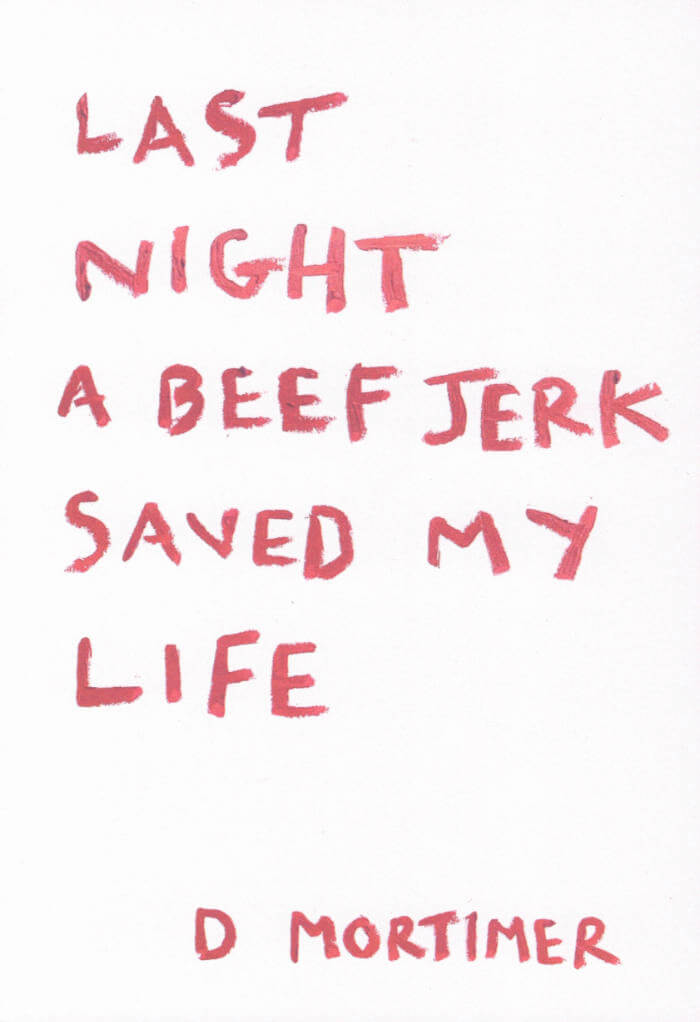
Last Night A Beef Jerk Saved My Life
'Mortimer is one of the most talented writers of our generation and their debut collection proves this. Part essay, part poem, part memoir and part SOS, Last Night a Beef Jerk Saved My Life navigates its thematic scope—ranging from transness, queerness and naming to loving and losing—with sensitivity, insight, humour and bravado. Best thing I read this year.' - Isabel Waidner
'Last Night a Beef Jerk Saved My Life is a wonderful and thoughtful reflection on love and beauty and bodies and music and memories, and on the constellations of small things that make up modern queer life.' - Huw Lemmey
D Mortimer is a writer from London focussed on trans crip narratives. Their work (essays, poetry, prose, creative-criticism) has appeared in Granta and been performed at the Institute of Contemporary Art in London (Queers Read This, The Kathy Acker Reading Group). Their short story ‘Supermarket Revelations’ was published in Liberating the Canon: An Anthology of Innovative Fiction (ed. Waidner, Dostoyevsky Wannabe: 2018) and a poem-essay, 'How To Draw Hands', was published by Warm Yourself by My Trash Fire in 2020.

All Us Girls Have Been Dead for So Long
Kathy Acker’s final published text, Eurydice in the Underworld, harnesses the Greek mythology of the heroic trip to hell; refocusing the story’s centre away from the male hero and onto the dead girl, who has been murdered by a snake.
Katabasis refers both to a journey into the underworld, and a trip to the coast. In times of climate crisis, hell – the realm of the dead, the scorching, the boiling, the rotting – is also situated at the sea, as waters heat, melt and rise.
First performed in 2019 at the ICA, London, All Us Girls Have Been Dead for So Long was a low-fi musical extravaganza flowing between beach and underworld, animating the animal, alien, and abject actors in our current climate apocalypse – most notably Ecco the Dolphin, who has lost their pod and must (like Eurydice, Orpheus and so on) travel deep beneath both time and space to rescue their missing and possibly dead kin.
Only a fool will now attempt to stop us girls. To halt our ecstatic singing.
A play in three acts by Linda Stupart and Carl Gent with a foreword by Isabel Waidner.